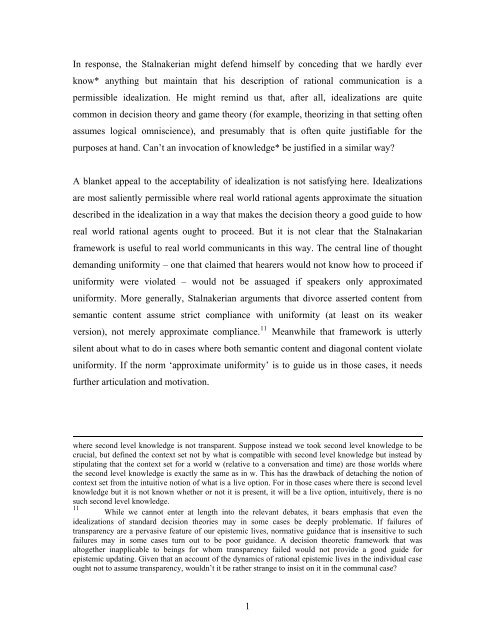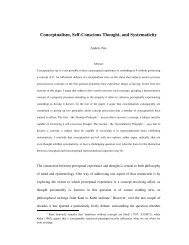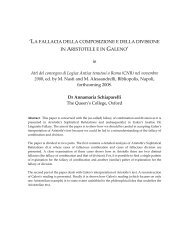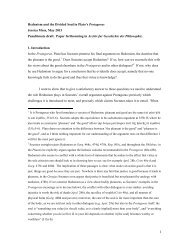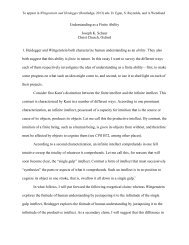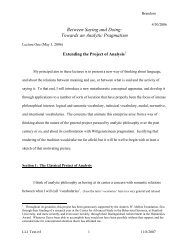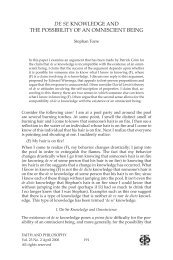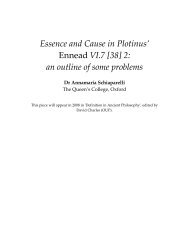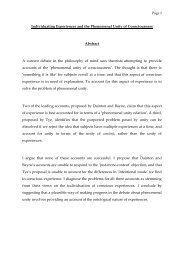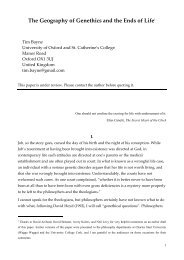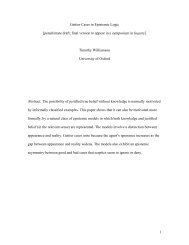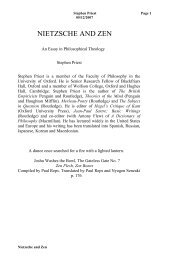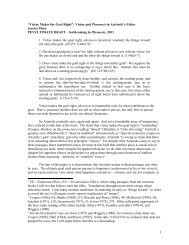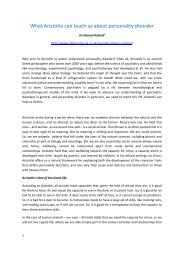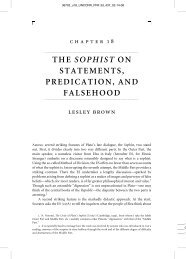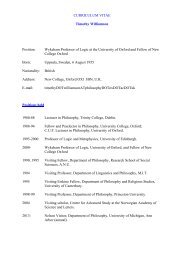In 'Assertion', Robert Stalnaker distinguishes between the sema
In 'Assertion', Robert Stalnaker distinguishes between the sema
In 'Assertion', Robert Stalnaker distinguishes between the sema
You also want an ePaper? Increase the reach of your titles
YUMPU automatically turns print PDFs into web optimized ePapers that Google loves.
<strong>In</strong> response, <strong>the</strong> <strong>Stalnaker</strong>ian might defend himself by conceding that we hardly ever<br />
know* anything but maintain that his description of rational communication is a<br />
permissible idealization. He might remind us that, after all, idealizations are quite<br />
common in decision <strong>the</strong>ory and game <strong>the</strong>ory (for example, <strong>the</strong>orizing in that setting often<br />
assumes logical omniscience), and presumably that is often quite justifiable for <strong>the</strong><br />
purposes at hand. Can’t an invocation of knowledge* be justified in a similar way?<br />
A blanket appeal to <strong>the</strong> acceptability of idealization is not satisfying here. Idealizations<br />
are most saliently permissible where real world rational agents approximate <strong>the</strong> situation<br />
described in <strong>the</strong> idealization in a way that makes <strong>the</strong> decision <strong>the</strong>ory a good guide to how<br />
real world rational agents ought to proceed. But it is not clear that <strong>the</strong> Stalnakarian<br />
framework is useful to real world communicants in this way. The central line of thought<br />
demanding uniformity – one that claimed that hearers would not know how to proceed if<br />
uniformity were violated – would not be assuaged if speakers only approximated<br />
uniformity. More generally, <strong>Stalnaker</strong>ian arguments that divorce asserted content from<br />
<strong>sema</strong>ntic content assume strict compliance with uniformity (at least on its weaker<br />
version), not merely approximate compliance. 11 Meanwhile that framework is utterly<br />
silent about what to do in cases where both <strong>sema</strong>ntic content and diagonal content violate<br />
uniformity. If <strong>the</strong> norm ‘approximate uniformity’ is to guide us in those cases, it needs<br />
fur<strong>the</strong>r articulation and motivation.<br />
where second level knowledge is not transparent. Suppose instead we took second level knowledge to be<br />
crucial, but defined <strong>the</strong> context set not by what is compatible with second level knowledge but instead by<br />
stipulating that <strong>the</strong> context set for a world w (relative to a conversation and time) are those worlds where<br />
<strong>the</strong> second level knowledge is exactly <strong>the</strong> same as in w. This has <strong>the</strong> drawback of detaching <strong>the</strong> notion of<br />
context set from <strong>the</strong> intuitive notion of what is a live option. For in those cases where <strong>the</strong>re is second level<br />
knowledge but it is not known whe<strong>the</strong>r or not it is present, it will be a live option, intuitively, <strong>the</strong>re is no<br />
such second level knowledge.<br />
11<br />
While we cannot enter at length into <strong>the</strong> relevant debates, it bears emphasis that even <strong>the</strong><br />
idealizations of standard decision <strong>the</strong>ories may in some cases be deeply problematic. If failures of<br />
transparency are a pervasive feature of our epistemic lives, normative guidance that is insensitive to such<br />
failures may in some cases turn out to be poor guidance. A decision <strong>the</strong>oretic framework that was<br />
altoge<strong>the</strong>r inapplicable to beings for whom transparency failed would not provide a good guide for<br />
epistemic updating. Given that an account of <strong>the</strong> dynamics of rational epistemic lives in <strong>the</strong> individual case<br />
ought not to assume transparency, wouldn’t it be ra<strong>the</strong>r strange to insist on it in <strong>the</strong> communal case?<br />
1


